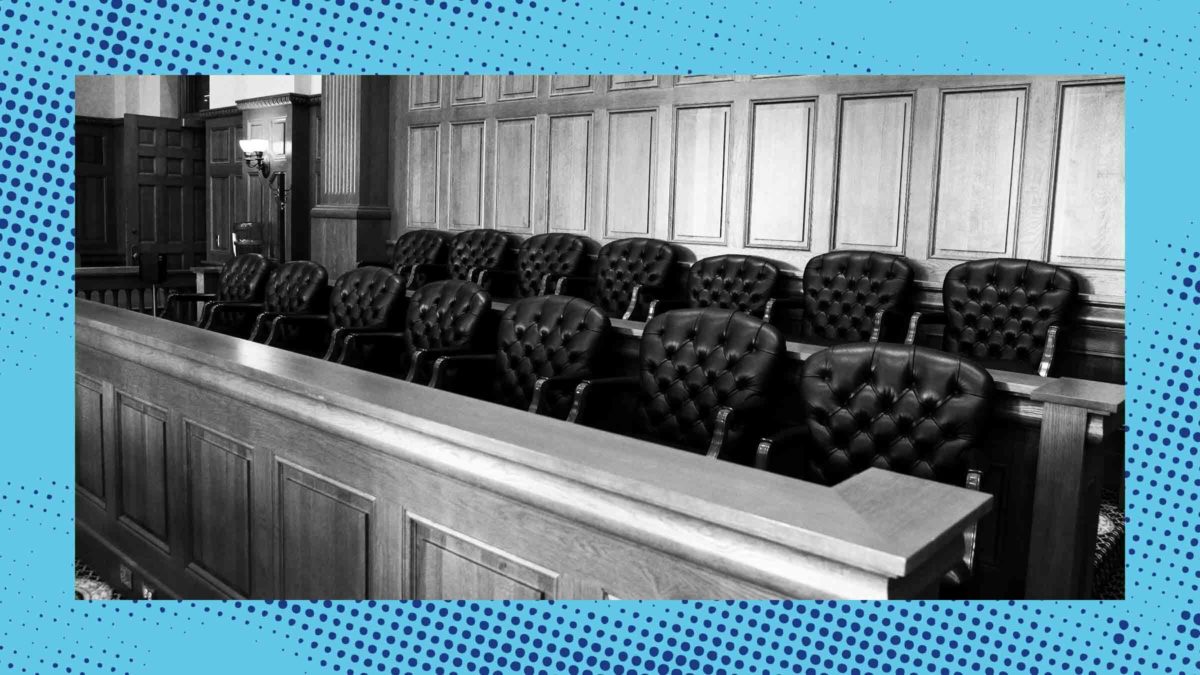If you’ve ever been called for jury duty, you probably remember the judge belaboring the point that a juror’s solemn duty is to follow the law exactly as written. During selection, you learn that it’s the jury’s duty to be “fair and impartial.” Before the trial starts, you have to swear that you will decide the case according to the evidence, not your opinion. At the end of the trial, the judge again reminds you that jurors must decide the case “solely on the evidence and the law” and not substitute their own opinions of what the law is or should be. If you as a juror are using your brain to do anything other than answer the narrow, technical question presented to you, chances are good the judge will be upset about it.
This stay-in-your-lane message to the jury sounds sensible enough, but it’s also an incomplete accounting of the jury’s power. An often-forgotten mechanism known as “jury nullification” is exactly what it sounds like: a tool that allows jurors to find a defendant not guilty of breaking the law because they disagree with the law itself. In theory, jury nullification should lurk in the back of every prosecutor’s mind at every stage of a trial—the knowledge that a jury is allowed to send a message to the state that certain prosecutions are unacceptable. In practice, today, it has been reduced to an obscure piece of trivia for social justice-minded law students and Ron Paul enthusiasts.
As far back as 1794, John Jay, the first Chief Justice of the United States, affirmed that it is “lawfully” within the jury’s power to disregard laws that they do not agree with or do not think should apply in a particular case. Just over one hundred years later, however, Justice John Marshall Harlan effectively gutted that right in Sparf v. United States, ruling that although jurors technically have the right to nullify charges, judges do not necessarily have to tell jurors about it. Without information about their power to nullify, practically speaking, modern juries have little hope of exercising it
Since then, other courts have compounded the damage that Sparf did to a right that stretches back to the pre-Revolutionary War era. At various points, appeals court judges have ruled that a judge can prevent a defense attorney from even mentioning nullification to the jury; that judges have an affirmative duty to prevent nullification, and can remove potential jurors who indicate that they intend to nullify; that a judge can give instructions strongly hinting that juries don’t have the power to nullify; and even that a judge can tell a juror who asks about their nullification powers that “there is no such thing as valid jury nullification” without having to face meaningful consequences.
The erosion of the right to jury nullification matters because historically, the prosecutions that have been subject to nullification are those that jurors, for political or moral reasons, did not agree merited criminal punishment. In the 1850s, for example, defense attorneys for people who helped slaves escape essentially put the Fugitive Slave Act itself on trial. In one case, they argued that if a juror believed the law to be unconstitutional, they were “bound by their oaths to disregard any direction to the contrary which the court might give them.”
Courts at every level protect the interests of the wealthy, the powerful, and the state at the expense of everyone else.
At the end of the nineteenth century, juries frequently nullified charges against workers that were related to high-profile strikes and other work stoppages. During Prohibition, as many as 60 percent of juries nullified charges in cases involving federal restrictions on alcohol, likely due to the increasing unpopularity of the Eighteenth Amendment. Vietnam War-era juries nullified in cases where the charges included conspiring to obstruct operations at a draft center, destroying draft files, and blocking trains carrying bombs. In 2010, a Montana state court judge presiding over a case involving marijuana charges worried he wouldn’t even be able to seat a jury after so many prospective jurors brought up nullification during the selection process. The prosecution eventually felt compelled to offer the defendant a plea deal rather than go to trial.
Judicial skepticism of jury nullification likely stems, at least in part, from the personal and professional backgrounds of the judges making these choices: The federal bench is disproportionately composed of former prosecutors. Among President Donald Trump’s judicial nominees, former prosecutors outnumbered former defense attorneys by a ratio of about ten to one. In other words, the very same people who once tried to persuade juries of a defendant’s guilt are now tasked with deciding what the jury does and does not hear about the scope of their own power. If there is anything truly bipartisan in this country, it is rewarding attorneys who have spent their careers putting people in cages with lifetime judgeships.
Nullification won’t come up in every single case, of course; jurors are unlikely to nullify in prosecutions for, say, murder. But there is no shortage of laws across the country that are ripe for nullification right now. Jurors could nullify when women are charged with crimes for seeking abortion care. Jurors could nullify when people face victimless drug charges that carry the potential of decades-long sentences. Jurors could nullify when migrants face a conviction that could tear them apart from their families for months, if not years, simply for crossing the border. There are countless examples of government overreach and unjust prosecutions in American courtrooms every day, and nullification is a way for individual people to act as a counterweight to government power.
Of course, nullification could just as easily be used for more nefarious purposes. During the Civil Rights Movement, there were reports of white juries nullifying charges brought against those who assaulted Black people. But this isn’t a reason to abandon this tool altogether. As law professor Paul Butler put it in a 2010 New York Times op-ed, “nullification is like any other democratic power; some people may try to misuse it, but that does not mean it should be taken away from everyone else.”
Unfortunately, rather than allow jurors to fully exercise their powers, today’s judges deliberately conceal that choice by scrubbing references to nullification from the entire process. Despite taking an oath to “impartially discharge” their duties, many judges instead act as a second prosecutor, putting their thumbs on the proverbial scales of justice by all but preventing jurors from considering the possibility of nullification. It is one more example of how courts at every level protect the interests of the wealthy, the powerful, and the state at the expense of everyone else.
Although it will take decades to reverse the damage the Trump administration inflicted on the judiciary, President Joe Biden’s court picks show some promising signs of change. So far, about two-thirds of his 51 nominees have experience advocating for individuals as defense attorneys, civil rights attorneys, and the like. As more controversial, dubious criminal prosecutions start to make their way in front of these new judges, perhaps they will be the ones to return power to the members of the jury—where it actually belongs.

